Fix: Outlook Sending winmail.dat Attachments
Even with Outlook being hugely popular, you can’t assume that the person you’re exchanging emails with is also using the same email client. Do some of your recipients complain about a sketchy winmail.dat file that you attach every time you send them an email? Don’t worry, you’re not alone.
What is the winmail.dat attachment?
Most of the popular mail managers handle email formats in similar ways. But when you send an email from Outlook or Exchange to a recipient that uses a different email client, they will receive a plain text message with an attachment named winmail.dat. This happens because Outlook uses a proprietary email format (Rich Text Format) that only a few other email clients can decipher. It’s used for various text enhancement like changing the text size or making it bold. As you might have guessed, it stores all the formatting commands in the winmail.dat file.
But receiving an extra attachment isn’t the problem. The real issue is, a recipient using an email outside of Microsoft’s scope won’t be able to access any real attachments from the email. Any attachments included in the message will be locked inside the winmail.dat file.
Stopping your Outlook from Sending winmail.dat attachments
Fortunately, there are multiple ways of stopping your Outlook from sending winmail.dat attachments. Each of the methods below tackles a different way of preventing your Outlook from including the winmail.dat attachment in your emails. Choose whichever seems more accessible and make sure you follow a method that is compatible with your Outlook version.
Note: If you’re on the receiving side, you only have two ways of getting rid winmail.dat attachments. You can either ask your senders to follow one the methods below or you can convert to Outlook, Exchange, Gmail and any other email client that supports the rich text format.
Method 1: Changing the default message format in Outlook settings (All Outlook Versions)
Outlook includes a useful setting that will enable you to stop your email client from sending messages in rich text format. The steps below are fully compatible with Outlook 2016 and Outlook 2013. If you have Outlook 2007, refer to the Note paragraphs for settings locations. Here’s how to change the message format from Outlook settings:
- Open Outlook and click the File tab in the top-left corner. Then, click on Options.
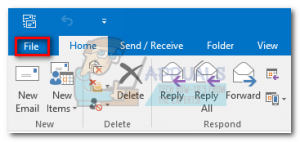
Note: In Outlook 2007, go to Tools > Options, then select the Mail Format tab. - Click the Mail tab to bring it forward, then access the drop-down menu next to Compose messages in this format.

- Select Plain Text from the drop-down menu and hit Ok to confirm.
Note: If you’re using Outlook 2007, you need to do an extra step. Click the Internet Format button and select Convert to Plain Text format (under Rich Text Options).
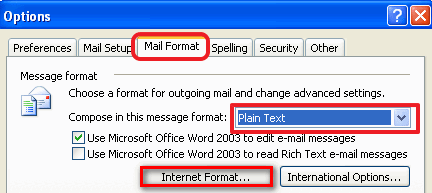
- That’s it, your Outlook program should now send winmail.dat attachments.
Method 2: Prevent winmail.dat attachments from going to particular recipients (Outlook 2016, 2013)
This method is much more precise since it allows you to specify which contacts can’t receive RTF format emails. Unfortunately, this operation is severely limited in Outlook 2016, because you can’t change sending preferences for email addresses that are already present your address book. Without further ado, here’s how to prevent certain recipients from receiving winmail.dat attachments:
Note: Make sure you follow the steps appropriated to your Outlook version:
Outlook 2016:
- Make sure the recipient is not in your Outlook Contacts.
- Open an email from the recipient or create a new email and insert his/her email address.
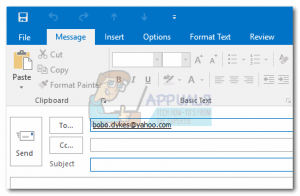
- Right-click on the email address and select Outlook Properties.
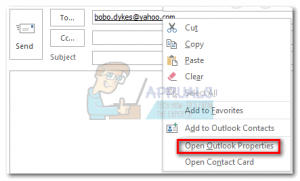
- Now, click the drop-down menu next to Internet format and set it to Send Plain Text only. Hit Ok to confirm.
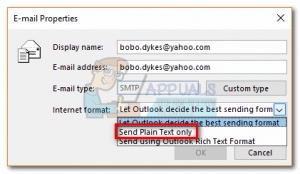
Outlook 2013:
- Open the recipient from your contact list.
- Double-click on the email address, then click the More Options icon. From the new menu, select Outlook Properties.
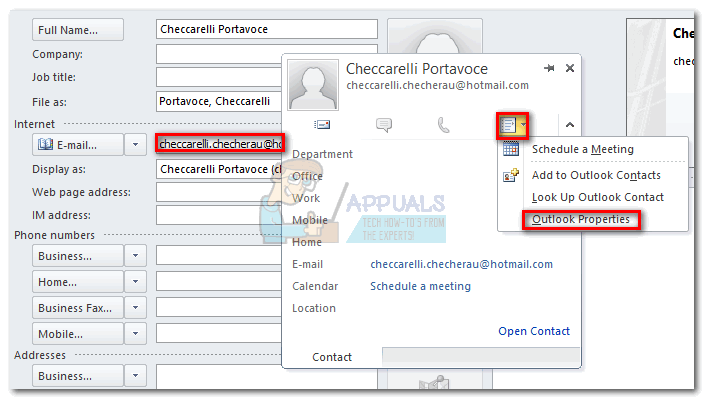 Note: Alternatively, you can simply right-click the email address and click on Open Outlook Properties.
Note: Alternatively, you can simply right-click the email address and click on Open Outlook Properties. - Click the drop-down menu next to Internet Format and set it to Send Plain Text only. Hit Ok to confirm.
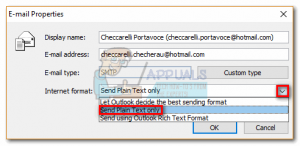
Method 3: Prevent Outlook from sending winmail.dat attachments via Registry Editor (All Outlook versions)
This method can have unforeseeable complications, so I would advise against it unless you don’t have another choice. We can manipulate a certain Outlook registry value to disable the proprietary email attachments used by Outlook. But keep in mind that doing this can affect other Outlook features that use this type of encoding such as Meeting Requests and Voting. If you’re ready, here’s t do do:
- Make sure Outlook and all associated dialog boxes are closed.
- Press the Windows key + R to open a run window. Type “regedit” and hit Enter to start Registry Editor.
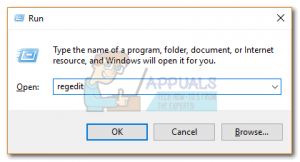
- Navigate to the following registry key based on your Outlook version:
Outlook 2016 – HKEY_CURRENT_USER \ Software \ Microsoft \ Office \ 16.0 \ Outlook \ Preferences
Outlook 2013 – HKEY_CURRENT_USER \ Software \ Microsoft \ Office \ 15.0 \ Outlook \ Preferences
Outlook 2010 – HKEY_CURRENT_USER \ Software \ Microsoft \ Office \ 14.0 \ Outlook \ Preferences
Outlook 2007 – HKEY_CURRENT_USER \ Software \ Microsoft \ Office \ 12.0 \ Outlook \ Preferences

- Right-click on Preferences, then go to New > Dword (32 bit) Value.

- Name the new Dword “DisableTNEF” and hit Enter to save.

- Double-click on DisableTNEF. Set the Base to Hexadecimal, then insert the value 1 in the box under Value data. Hit Ok and close the Registry Editor.
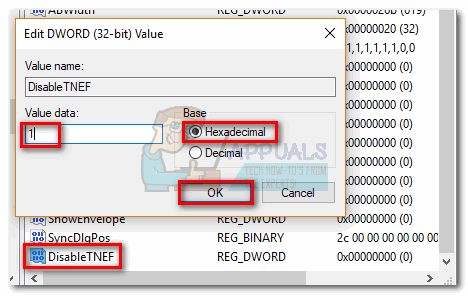
That’s it. Outlook is now configured to stop sending winmail.dat attachments.